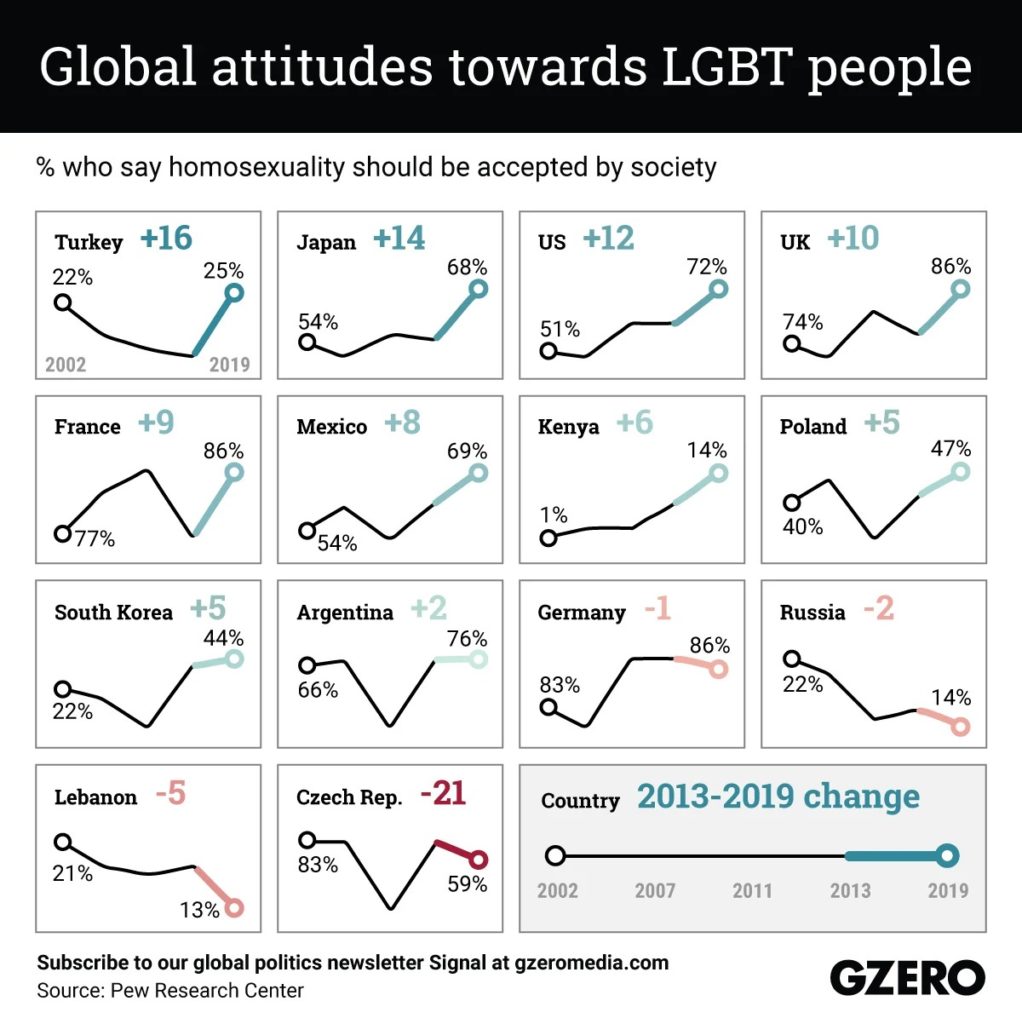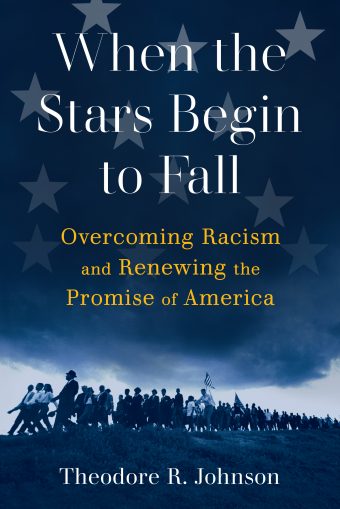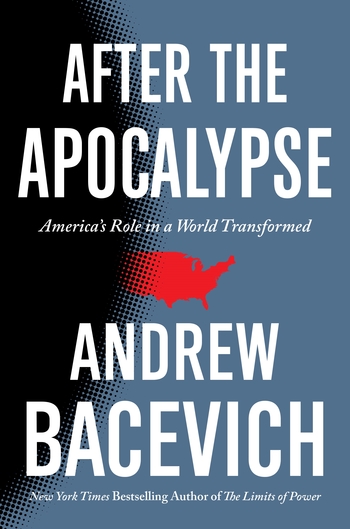Volcanoes are erupting in The Philippines, but on-fire Australia received some welcome rain. The Iran war cries have been called off and The Donald’s military powers are about to be hamstrung by the Senate. Meanwhile, his impeachment trial is starting, and we’re all on Twitter for a front-row seat.
What Could Go Right? Gay marriage: from no way to no problem
Our latest newsletter includes milestone support for same-sex marriage, why the pandemic economic rebound going better than expected, and progress news from around the world.
This is our weekly newsletter, What Could Go Right? Sign up here to receive it in your inbox every Thursday at 6am. You can read past issues here.
Congratulations to our giveaway winner, Sean Kessler, from Pennsylvania, US! He chose to donate his $50 winnings to Bringing Hope Home, a charity that provides financial and emotional support to families that are struggling with the effects of cancer diagnoses.
“I believe that marriage is the union between a man and a woman. Now, for me as a Christian . . . it is also a sacred union. God’s in the mix.”
That is former US President Barack Obama speaking in 2008. Just how poorly that quote has aged is a sign of the lightning-fast progress we’ve made on LGBTQ rights and acceptance. In the US, same-sex marriage in particular went from high-intensity debate to a given in most states during the span of a decade.
We mentioned last week that support for same-sex marriage has reached a record high in the US, with 70% in support. There was another milestone in that Gallup poll as well: it’s the first time that more than half of Republicans, 55%, are in support. To put things in perspective, when Gallup first polled whether gay and lesbian marriages should have legal recognition in 1996, only 27% of Americans agreed. It’s noteworthy that in faith groups, too, support is growing, even in the evangelical community.
Worldwide, same-sex marriage is legal in only 29 countries—another 20 recognize civil unions—but attitudes are starting to shift:

Although we are wondering what the heck is going on in the Czech Republic.
Japan, the only G7 country where same-sex marriage is still banned, is taking steps toward legalization. And in India, where the road toward acceptance looks far longer, last week a judge put Tamil Nadu on track to become the first Indian state to ban conversion therapy. (Shoutout to Justice N Anand Venkatesh, who wrote in the order about his own changed attitudes toward the LGBTQ community.)
You can get the full download on LGBTQ rights around the world in our latest Progress in 5 Minutes.
June is also National Ocean Month. You might have heard that the world gained an ocean last week—hey there, Southern Ocean—which might not exactly be progress but is fun in a nerdy kind of way. We also wanted to highlight this great underdog story, in which a group of eight, mostly tiny Pacific island countries banded together to outsmart powerhouses like the US, Japan, and China, who were not only overfishing their waters for tuna but also sharing none of the profits. It took almost 30 years to find the right cooperative formula, but finally, the group has been able to ensure the health of the ocean’s ecosystem and take part in the fishing’s significant revenue, which has meant budgets for social spending, infrastructure work, sustainability efforts, and more. Click the link for the full tale.
Philanthropist MacKenzie Scott is out there doing the most again, having announced her third multi-billion “use as you choose” donation round. (Jeff, maybe you can concentrate less on building yachts and more on copying your ex-wife’s behavior.) Scott has given away more than $8 billion in less than a year.
A Rwandan farmer shares his surprise at receiving a no-strings-attached donation from GiveDirectly, one of the organizations that Scott has donated generously to.
While we applaud Scott’s philanthropy, especially her deeply unusual approach to it, we also acknowledge the queasiness around having public policy essentially “based on rich people’s priorities,” as TPN Member Scott Galloway put it in his latest podcast episode on income inequality.
Before we go, some quick hits on the pandemic front: Novavax, the latest effective COVID-19 vaccine, is easy to store and transport, global crime decreased during the pandemic (heads up: that link is a study), vaccine hesitancy is disappearing in Britain, and Vermont becomes the first US state to be 80% vaccinated. Grab the Ben and Jerry’s!
Below in the links section, Indonesia is going electric, a new national hotline to handle mental health calls, and more.

The pandemic rebound is here. In a new OECD report, projections for global economic growth have been revised sharply upwards. The recovery is uneven: while countries like Korea and Russia have already reached pre-pandemic GDP levels, other countries will take years. That said, it’s still movement in the right direction.
From us: Texas is going through changes—and how Texans are reacting could offer a roadmap for a more united American future. A new report from the nonpartisan nonprofit More in Common US, The Threads of Texas, takes a deep dive into the “dramatic shifts and changes” happening in the Lone Star State. The Progress Network spoke with the study’s senior researcher and author, Noelle Malvar, about the report’s findings, and how they speak to the broader national conversation on big-ticket items like race, immigration, and the economy. Read more about The Threads of Texas.
Progress, Please
(Found good news? Tweet at us @progressntwrk or email.)
Other good stuff in the news 🦟
- A mosquito experiment cut dengue fever cases by 77% in an Indonesian city | The Atlantic
- President Biden is aiming to double the number of Black women appeals court justices | USA Today
- Google plans to change its search algorithm to prevent online slander | The New York Times
- How same-sex marriage broke through partisan politics | FiveThirtyEight
- A celebration of the expanded Child Tax Credit and a plea to make it permanent | Slow Boring
- Mobile crisis response units—staffed with mental health professionals—are responding to mental health crises in Montana (Editor’s note: a national 988 hotline that will connect people with mental health counselors and suicide prevention specialists is slated to be launched by July 2022) | Kaiser Health News
- Indonesia aims to sell only electric vehicles by 2050 | CNA
- Remote working has helped India Inc improve its gender diversity quotient | Quartz
- Countries in Southeast Asia are speeding up their vaccination efforts | The Sydney Morning Herald
- For the first time in more than 100 years, white-tailed eagles appeared at Scotland’s Loch Lomond | BBC
TPN Member originals 🧠
- TPN Member Nicholas Christakis on how people are wired for goodness | Krista Tippett
- America can still choose solidarity, and the Black experience shows the way (read more about this in Johnson’s new book, which we’ve shared below) | Theodore R. Johnson
- Johnson also joined Persuasion to offer an optimistic vision for America’s future | Yascha Mounk
- As we approach the 50th anniversary of the release of the Pentagon Papers, have we learned what we should have? (we have more on Bacevich’s new book below as well) | Andrew J. Bacevich
- Are we as divided as we think we are? | Bobby Duffy
- The pandemic could help Americans embrace aging skin | Ashton Applewhite
Upcoming Events
Future Cities Briefing: Singapore | Ayesha Khanna | July 7
Why Mobility is Destiny | Parag Khanna | October 13
On Our Bookshelf

In TPN Member Theodore R. Johnson’s new book, When the Stars Begin to Fall, he declares racism a refutation of the American Promise enshrined in our Constitution that all men and women are inherently equal. If we cannot overcome it, Johnson argues, the promise that made America unique on Earth will have died.
When the Stars Begin to Fall makes a compelling, ambitious case for a pathway to the national solidarity necessary to mitigate racism. Weaving memories of his own and his family’s multi-generational experiences with racism into his elegant narrative, Johnson posits that a blueprint for national solidarity can be found in the exceptional citizenship long practiced in Black America. If racism is a structural crime of the state, he argues, overcoming it requires us to recognize that a color-conscious society—not a color-blind one—is the true fulfillment of the American Promise.
Learn more about the book here.

The purpose of US foreign policy has, at least theoretically, been to keep Americans safe. Yet as we confront a radically changed world, it has become indisputably clear that the terms of that policy have failed. Washington’s insistence that a market economy is compatible with the common good, its faith in the idea of the “West” and its “special relationships,” its conviction that global military primacy is the key to a stable and sustainable world order—these have brought endless wars and a succession of moral and material disasters.
In After the Apocalypse, a bold reconception of America’s place in the world informed by thinking from across the political spectrum, TPN Member Andrew J. Bacevich lays down a new approach—one that is based on moral pragmatism, mutual coexistence, and war as a last resort. Confronting the threats of the future—accelerating climate change, a shift in the international balance of power, and the ascendance of information technology over brute weapons of war—his vision calls for nothing less than a profound overhaul of our understanding of national security.
Learn more about the book here.
Until next time, pillow fight! 👇


